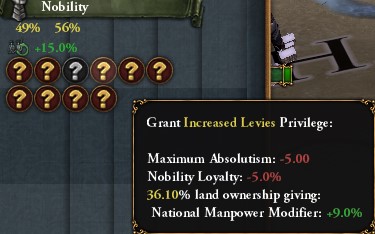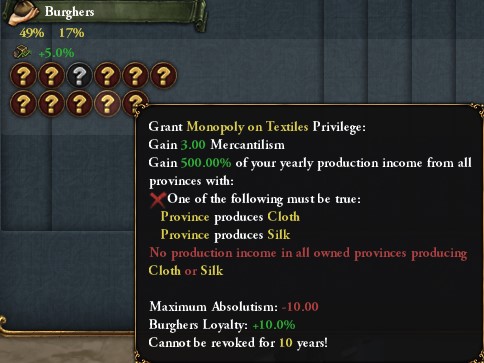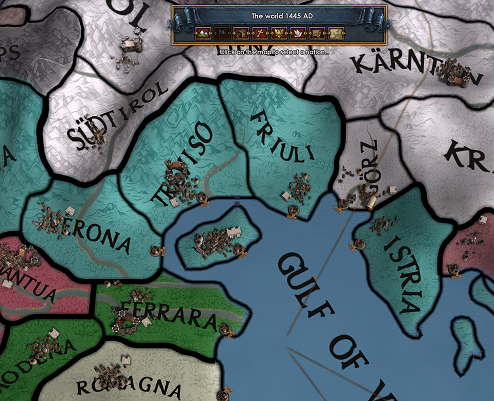Good day all, Tuesday is here once again as it often is, so let's dive into another Dev Diary for the upcoming European Update. Last week we were all about how you can project your power externally, so this week let's look more internally, with focus on Estates.
Back in April we had a dev diary which was largely an expunge of thoughts on the Estates feature, where it's been and we still want to take it. Let's get a recap on our thoughts from then:
Over the past few months we've been pondering how we can make such aspirations a reality, and today we'll share where we are with that.
As mentioned last week, and will continue to be mentioned, any numbers seen and especially interfaces seen, are not in their final form

As teased earlier, one of the first things we did with Estates is completely remove their relationship with individual provinces. This interaction with estates was always micro intensive, deeply confusing for new players, caused a lot of issues with 1444 setup for many nations (Nobles eating all my gold provinces) and scaled fairly terribly into the late game. It was not without its charms: assigning individual estates to individual provinces could have a nice internal management feel, but it was not an action that lent itself well to the expansion loop of the game. It was hard to feel excited about the estate allocation to your newest 20 provinces, while a tall player would have little interaction to be done throughout the entire game.
The death of direct province ties gives birth to a new concept in EUIV, that of Crown Land. Every nation with Estates has their Crown Land to manage. Much like how previously Estates started with a share of provinces, now they own a certain percentage of Crown Land. There is 100% of Crown Land which is divided between the various Estates, and the nation's own full control.

Pie-chart, coder art flavour. The French have yet to reign in their nobles
Estates' portion of Crown Land will heavily affect their influence, as well as many of the interactions you have with them. Conversely, your nation's control over Crown Land is of grave importance: If you want to be a strong, absolutist state heaving into the Age of Absolutism, you'll want to wrestle control away from your estates, and giving up all of your crown land will have negative effects of your control over the nation.
You have many avenues of influence over Crown Land. Firstly, there are three direct interactions available in the Estate Screen.
Another big change happening here are with the interactions one has with the estates. I'll refer to an excellent post from the aforementioned dev diary.
We don't want Estates to be the monarch point and advisor generating buttons that you hammer every couple decades, but in reality, it's how a lot of people use it. Heck, it's how I use it, so what's to be done here?
We actually turned this into a guiding principal of designing the Estate screen and their interactions. We were not to have any interactions which the user would return there on a regular pulse to repeat. As such, all old Estate interactions have been removed, and we have instead introduced a system of Estate Privileges


Once again, all numbers and Interfaces are far from complete. You won't be seeing a screen full of ??? on release (well, I certainly hope not)
Rather than actions with cooldowns that you demand or bestow your Estates as before, these Privileges are meaty interactions that you can choose to take with your estates. They will impact on their Influence/Loyalty/Crown Land Share and come with a variety of effects, often wide reaching, long lasting and more often than not, impacting on your maximum absolutism. When the age of Absolutism comes around, you may well consider revoking these Privileges to gain absolute control over the state (Although if your ambitions are Revolutionary, you may have other plans...)
Each Estate type have their own Privileges and many of the old functions of estates are accounted for. The nobility, for example, can give you added military power per month if you're willing to guarantee them precious crown land, while the Rajputs will enable the direct recruitment of Rajput Regiments, in exchange for permanently increased influence. While such Privileges can be revoked, much like seizing the crown land away from them, you will invoke their ire, and should be done when you have either sufficiently appeased the estates through other means, or are ready to deal with their rebellions.
We'll certainly be back to talk more about these Estate changes as development on the upcoming European Update continues. As ever, questions and comments are welcome in this thread, and next week we'll go on to talk about another sizeable change of a more Ecumenical variety.

Back in April we had a dev diary which was largely an expunge of thoughts on the Estates feature, where it's been and we still want to take it. Let's get a recap on our thoughts from then:
Over the past few months we've been pondering how we can make such aspirations a reality, and today we'll share where we are with that.
As mentioned last week, and will continue to be mentioned, any numbers seen and especially interfaces seen, are not in their final form

As teased earlier, one of the first things we did with Estates is completely remove their relationship with individual provinces. This interaction with estates was always micro intensive, deeply confusing for new players, caused a lot of issues with 1444 setup for many nations (Nobles eating all my gold provinces) and scaled fairly terribly into the late game. It was not without its charms: assigning individual estates to individual provinces could have a nice internal management feel, but it was not an action that lent itself well to the expansion loop of the game. It was hard to feel excited about the estate allocation to your newest 20 provinces, while a tall player would have little interaction to be done throughout the entire game.
The death of direct province ties gives birth to a new concept in EUIV, that of Crown Land. Every nation with Estates has their Crown Land to manage. Much like how previously Estates started with a share of provinces, now they own a certain percentage of Crown Land. There is 100% of Crown Land which is divided between the various Estates, and the nation's own full control.

Pie-chart, coder art flavour. The French have yet to reign in their nobles
Estates' portion of Crown Land will heavily affect their influence, as well as many of the interactions you have with them. Conversely, your nation's control over Crown Land is of grave importance: If you want to be a strong, absolutist state heaving into the Age of Absolutism, you'll want to wrestle control away from your estates, and giving up all of your crown land will have negative effects of your control over the nation.
You have many avenues of influence over Crown Land. Firstly, there are three direct interactions available in the Estate Screen.
- Sale of Titles
- Sell 5% Crown Land to the Estates based on Influence for 1 Year of Income
- +5% All Estate Loyalty
- Seize Land
- Gain 3% Crown Lands, estates loses based on their influence
- -10% All Estate Loyalty
- Give +5 Unrest to random provinces up until you equivalent development the estates hold.
- Spawn rebels fitting for the most influential estate type.
- Summon the Diet
- [REDACTED]
- [REDACTED]
- [REDACTED]
Another big change happening here are with the interactions one has with the estates. I'll refer to an excellent post from the aforementioned dev diary.
We don't want Estates to be the monarch point and advisor generating buttons that you hammer every couple decades, but in reality, it's how a lot of people use it. Heck, it's how I use it, so what's to be done here?
We actually turned this into a guiding principal of designing the Estate screen and their interactions. We were not to have any interactions which the user would return there on a regular pulse to repeat. As such, all old Estate interactions have been removed, and we have instead introduced a system of Estate Privileges


Once again, all numbers and Interfaces are far from complete. You won't be seeing a screen full of ??? on release (well, I certainly hope not)
Rather than actions with cooldowns that you demand or bestow your Estates as before, these Privileges are meaty interactions that you can choose to take with your estates. They will impact on their Influence/Loyalty/Crown Land Share and come with a variety of effects, often wide reaching, long lasting and more often than not, impacting on your maximum absolutism. When the age of Absolutism comes around, you may well consider revoking these Privileges to gain absolute control over the state (Although if your ambitions are Revolutionary, you may have other plans...)
Each Estate type have their own Privileges and many of the old functions of estates are accounted for. The nobility, for example, can give you added military power per month if you're willing to guarantee them precious crown land, while the Rajputs will enable the direct recruitment of Rajput Regiments, in exchange for permanently increased influence. While such Privileges can be revoked, much like seizing the crown land away from them, you will invoke their ire, and should be done when you have either sufficiently appeased the estates through other means, or are ready to deal with their rebellions.
We'll certainly be back to talk more about these Estate changes as development on the upcoming European Update continues. As ever, questions and comments are welcome in this thread, and next week we'll go on to talk about another sizeable change of a more Ecumenical variety.




